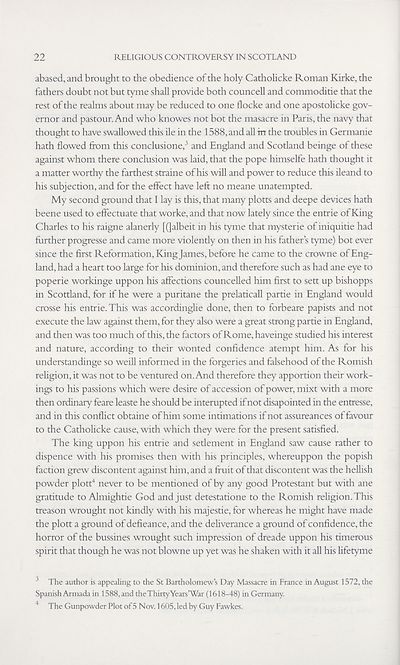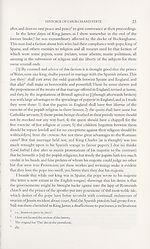Series 5 > Religious Controversy in Scotland 1625-1639
(37) Page 22
Download files
Complete book:
Individual page:
Thumbnail gallery: Grid view | List view

22
RELIGIOUS CONTROVERSY IN SCOTLAND
abased, and brought to the obedience of the holy Catholicke Roman Kirke, the
fathers doubt not but tyme shall provide both councell and commoditie that the
rest of the realms about may be reduced to one flocke and one apostolicke gov¬
ernor and pastour. And who knowes not bot the masacre in Paris, the navy that
thought to have swallowed this ile in the 1588, and all in the troubles in Germanie
hath flowed from this conclusione,3 and England and Scotland beinge of these
against whom there conclusion was laid, that the pope himselfe hath thought it
a matter worthy the farthest straine of his will and power to reduce this ileand to
his subjection, and for the effect have left no meane unatempted.
My second ground that I lay is this, that many plotts and deepe devices hath
beene used to effectuate that worke, and that now lately since the entrie of King
Charles to his raigne alanerly [Q albeit in his tyme that mysterie of iniquitie had
further progresse and came more violently on then in his father s tyme) bot ever
since the first Reformation, King James, before he came to the crowne of Eng¬
land, had a heart too large for his dominion, and therefore such as had ane eye to
poperie workinge uppon his affections councelled him first to sett up bishopps
in Scottland, for if he were a puritane the prelaticall partie in England would
crosse his entrie. This was accordinghe done, then to forbeare papists and not
execute the law against them, for they also were a great strong partie in England,
and then was too much of this, the factors of Rome, haveinge studied his interest
and nature, according to their wonted confidence atempt him. As for his
understandinge so weill informed in the forgeries and falsehood of the Romish
religion, it was not to be ventured on. And therefore they apportion their work¬
ings to his passions which were desire of accession of power, mixt with a more
then ordinary feare leaste he should be interupted if not disapointed in the entresse,
and in this conflict obtaine of him some intimations if not assureances of favour
to the Catholicke cause, with which they were for the present satisfied.
The king uppon his entrie and setlement in England saw cause rather to
dispence with his promises then with his principles, whereuppon the popish
faction grew discontent against him, and a fruit of that discontent was the hellish
powder plott4 never to be mentioned of by any good Protestant but with ane
gratitude to Almightie God and just detestatione to the Romish religion. This
treason wrought not kindly with his majesrie, for whereas he might have made
the plott a ground of defieance, and the deliverance a ground of confidence, the
horror of the bussines wrought such impression of dreade uppon his timerous
spirit that though he was not blowne up yet was he shaken with it all his lifetyme
3 The author is appealing to the St Bartholomew’s Day Massacre in France in August 1572, the
Spanish Armada in 1588,and the Thirty Years’War (1618-48) in Germany.
The Gunpowder Plot of 5 Nov. 1605, led by Guy Fawkes.
RELIGIOUS CONTROVERSY IN SCOTLAND
abased, and brought to the obedience of the holy Catholicke Roman Kirke, the
fathers doubt not but tyme shall provide both councell and commoditie that the
rest of the realms about may be reduced to one flocke and one apostolicke gov¬
ernor and pastour. And who knowes not bot the masacre in Paris, the navy that
thought to have swallowed this ile in the 1588, and all in the troubles in Germanie
hath flowed from this conclusione,3 and England and Scotland beinge of these
against whom there conclusion was laid, that the pope himselfe hath thought it
a matter worthy the farthest straine of his will and power to reduce this ileand to
his subjection, and for the effect have left no meane unatempted.
My second ground that I lay is this, that many plotts and deepe devices hath
beene used to effectuate that worke, and that now lately since the entrie of King
Charles to his raigne alanerly [Q albeit in his tyme that mysterie of iniquitie had
further progresse and came more violently on then in his father s tyme) bot ever
since the first Reformation, King James, before he came to the crowne of Eng¬
land, had a heart too large for his dominion, and therefore such as had ane eye to
poperie workinge uppon his affections councelled him first to sett up bishopps
in Scottland, for if he were a puritane the prelaticall partie in England would
crosse his entrie. This was accordinghe done, then to forbeare papists and not
execute the law against them, for they also were a great strong partie in England,
and then was too much of this, the factors of Rome, haveinge studied his interest
and nature, according to their wonted confidence atempt him. As for his
understandinge so weill informed in the forgeries and falsehood of the Romish
religion, it was not to be ventured on. And therefore they apportion their work¬
ings to his passions which were desire of accession of power, mixt with a more
then ordinary feare leaste he should be interupted if not disapointed in the entresse,
and in this conflict obtaine of him some intimations if not assureances of favour
to the Catholicke cause, with which they were for the present satisfied.
The king uppon his entrie and setlement in England saw cause rather to
dispence with his promises then with his principles, whereuppon the popish
faction grew discontent against him, and a fruit of that discontent was the hellish
powder plott4 never to be mentioned of by any good Protestant but with ane
gratitude to Almightie God and just detestatione to the Romish religion. This
treason wrought not kindly with his majesrie, for whereas he might have made
the plott a ground of defieance, and the deliverance a ground of confidence, the
horror of the bussines wrought such impression of dreade uppon his timerous
spirit that though he was not blowne up yet was he shaken with it all his lifetyme
3 The author is appealing to the St Bartholomew’s Day Massacre in France in August 1572, the
Spanish Armada in 1588,and the Thirty Years’War (1618-48) in Germany.
The Gunpowder Plot of 5 Nov. 1605, led by Guy Fawkes.
Set display mode to:
![]() Universal Viewer |
Universal Viewer | ![]() Mirador |
Large image | Transcription
Mirador |
Large image | Transcription
Images and transcriptions on this page, including medium image downloads, may be used under the Creative Commons Attribution 4.0 International Licence unless otherwise stated. ![]()
| Scottish History Society volumes > Series 5 > Religious Controversy in Scotland 1625-1639 > (37) Page 22 |
|---|
| Permanent URL | https://digital.nls.uk/127328409 |
|---|
| Description | Over 180 volumes, published by the Scottish History Society, containing original sources on Scotland's history and people. With a wide range of subjects, the books collectively cover all periods from the 12th to 20th centuries, and reflect changing trends in Scottish history. Sources are accompanied by scholarly interpretation, references and bibliographies. Volumes are usually published annually, and more digitised volumes will be added as they become available. |
|---|

![[Page 21]Historie of Church and State](https://deriv.nls.uk/dcn4/1273/2839/127328399.4.jpg)
